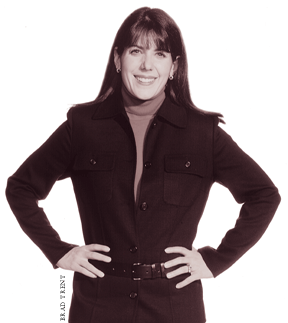
From paying off your credit card debt to helping your kids manage their allowance, these members of the Class of 1986 have the answers to all your financial questions.
By Leslie Whitaker | Illustration by Josef Gast
“Seek feedback aggressively and don’t personalize what you hear.”
—Susan Abrams, The New Success Rules for Women
“Be sure that the bottle [of wine] you order is the bottle you receive. Sometimes a restaurant will cavalierly substitute a less expensive year but still charge you the higher price.”
—Jean Chatzky, Talking Money: Everything You Need to Know about Your Finances and Your Future
“Soon or later every parent gets around to thinking about the unthinkable: Who would raise my children if something were to happen to me? Who would provide for them if I weren’t around? The way to answer those questions, of course, is to name a guardian in your will.”
—Carolyn Geer, Fortune magazine, February 21, 2000
Wondering how to boost your retirement savings? Whether you should set short- or long-term career goals? How to invest online? Chances are, just about any question you might have about personal finance or career development can be answered by one of three women from the Class of 1986: Jean Sherman Chatzky C’86, Carolyn T. Geer C’86 and Susan Abrams W’86 C’86.
Chatzky, the best-known of the three, is NBC’s Today show financial contributor. She also appears regularly on MSNBC and serves as a columnist for Money and USA Today. Geer writes Fortune’s “Money Manager” column and selected feature articles. Abrams, a Visiting Scholar at Northwestern University’s Kellogg School of Management, became an author after stints as a non-profit executive, management consultant and investment banker.
While only two of these three business writers knew each other at Penn—Chatzky and Abrams—they share many traits. Two were English majors (Chatzy and Geer). Two married Penn alums (Geer and Abrams). Two have offices in the Time-Life Building in midtown Manhattan (Chatzky and Geer). And all three joyfully combine career and motherhood. Here’s what they’re up to as their 15th Reunion approaches this spring.
JEAN SHERMAN CHATZKY

6:30 a.m.: In her New York suburban home, Chatzky hits the shower. 7:00:Feeds the kids. 7:30: Greets the nanny. 8:00: Walks her first-grader, Jake, to the bus, then heads for the commuter train. 8:30: Arrives in Manhattan and heads to her office at Money to work on a column. 11:00:Takes a car service cab to MSNBC studios in Secaucus, New Jersey. 11:30: Submits to make-up and returns phone calls. 1:00 p.m.:On the air, interviews Wall Street analyst. 2:00:Rides back to Manhattan, returning calls from car. 3:00:Back at the office, finishes column, and consults by telephone with Today producers. 4:30:Gets hair cut at Louis Licari’s Fifth Avenue salon by favorite Today hair stylist. 5:30:Boards commuter train home.
Not all her work
days are so chockfull, Chatzky claims, but that’s hard to believe. Her
disciplined, high-energy work habits allow her to produce a steady stream
of columns and television appearances, most of which require a good bit
of reporting. “We do the research for people so they don’t have to do
hours of it themselves,” explains Chatzky. “They want answers to questions
like ‘What’s the best credit-card rate you can get right now?’”
Chatzky
knows what it means to be pressed for time. She has vowed to squeeze her
high-profile career into a four-day workweek. Mondays are reserved for
her children, Jake (six) and Julia (three). Business trips—even to California—are
limited to one day, if at all possible. That way she has time to take
Julia out for “Ladies’ Lunches.” (Julia loves sushi, so they often go
to Japanese places.)
Chatzky’s newest “baby,” however, is Talking Money, published by Warner Books this month. Its friendly tone and straightforward explanations, not to mention the author’s widespread exposure, make it a likely bestseller. “Jean’s talent is simplifying complex topics,” says Robert Shepard C’83 G’83, her literary agent (see box.) Chatzky’s winning introduction to home-buying offers a humorous glimpse of her own experience: “In fall of 1993, my husband, Peter, started angling to flee Manhattan for a house in the suburbs. He was so ready for a backyard and a barbecue he’d talked me into buying one of those electric grills, setting it on the table in our tiny kitchen (which was thankfully next to a window), and cooking a flank steak for company. The kitchen filled with smoke before the meat was anywhere near done. I finished it under the broiler and called a broker the next day.” Chatzky’s easy-to-digest volume covers all the financial basics—goal setting, paying down debt, saving, spending, investing, college tuition planning, insurance, estate planning, real estate and retirement.
Most challenging, says the financial guru, is persuading people who have yet to start saving. “When I go out and give speeches, I still find people need extra help getting going, so I use the numbers,” says Chatzky. “If you can sock away $25 a month, by the end of the year you will have hundreds, then thousands. The minute you start to put money away, you want to do more. I really believe it’s like a snowball.”
Chatzky’s own career snowballed, but it took persistence and hard work to get it rolling. After graduating from Penn, where she received the prestigious Althea K. Hottel Award, Chatzky aspired to be a journalist. So she signed on as assistant to Ann Molligan Smith, Working Woman’s business editor. After two years, she moved to Business Traveler International. When she decided she needed the rigorous business training that Forbes was renowned for, Chatzky applied there. But her interviewer was not enthusiastic. He thought her experience “too soft,” she recalls. “He said, ‘I have a stack of resumes and you’re way at the bottom.’”
Undeterred, Chatzky lined up a job in Dean Witter’s equity research department so she could get some hands-on business experience, and two years later, again applied to Forbes. This time the reception was different. Her interviewer used the same line—he had a stack of applicants’ resumes—but now she was second in line.
Forbes hired her, but Chatzky didn’t stay long. After only a year she decided to jump, along with several of her colleagues, to a start-up devoted to personal finance, SmartMoney. Several Forbes staffers were bearish on the move, she recalls. “They said, ‘There goes your career. All you’ll write about will be mutual funds.”
Well, they called that one wrong. She tackled all sorts of interesting subjects, from a piece titled “The Cult of Quicken,” about “how that particular personal finance program became a perhaps-more-important-than-necessary part of some of its users’ lives” to a story about a couple who were turned down in their attempt to purchase a Body Shop franchise “for not being politically correct enough.” It was also there that Chatzky got her big break. The magazine was asked to send an editor to appear on the early morning show produced by NBC’s New York affiliate. But after just one morning of dragging out of bed at 4:30 a.m., the editor who was selected begged off. “Jean,” he offered, “Would you like to do it instead?” She jumped at the chance.
Chatzky’s combination of good looks, on-air warmth and clear explanations impressed the powers-that-be at the network’s Today show three years later when they were looking for a new financial contributor. And it didn’t hurt that her former colleague at the local affiliate, Matt Lauer, who by then had become Today’s co-host, put in a good word. Chatzky started out rotating with another contributor, but eventually took over the entire slot.
During her appearances on MSNBC, Chatzky reports on the investments of an on-air investment club and frequently interviews prominent money managers. During the uncertainty over who would be the next president, Chatzky tailored her commentary to the news of the week, answering questions like, “What was the effect of the unsettled election on the stock market?” “Which stocks would thrive if Gore were president?” “Which stocks would thrive if Bush were president?”
Chatzky credits Penn with starting her down her career path. She enrolled expecting to be a math major, but after earning a C in introductory calculus, started searching for other possibilities. As a reporter at the Daily Pennsylvanian, Chatzky found she much preferred writing feature stories to breaking news. Advised by a student editor to try Nora Magid’s course in advanced nonfiction writing, she found her calling.
Magid’s first assignment asked students to tell her about themselves. A confused sophomore at the time, Chatzky confessed, “I don’t know what I’m good at or what I want to do with my life.” Next to that line Magid wrote back, “I think you do now.” Chatzky calls Magid’s course a “de facto journalism program” that turned out numerous graduates who excelled in the field. “She was very practical. She had worked in the industry, so she knew what was needed.”
Chatzky also had an interest in business, which she explored by taking some Wharton courses. Most happy in marketing, she made that her minor.
Chatzky works hard at applying her advice under her own roof. Even though she doesn’t necessarily approve of her son’s plans for his $2 weekly allowance, for instance, she has vowed not to interfere. “I don’t think you can impose your values on their purchases,” she says. Every Sunday she dutifully measures out a $1 bill and four quarters, the denomination that fits those grocery-store candy machines he can’t resist. And even though she’d prefer that he rent rather than purchase the new Pokemon 2000 video, she encourages Jake to save for it by herself matching every penny he puts away. As she says in her new book, “The best way to teach wise spending habits is to let your kids make their own money mistakes.” But when it comes to adults, Chatzky can’t help but try to step in.
SUSAN ABRAMS

“Ninety Fortune 500 companies had no women corporate officers in 2000, not much progress since 1995 when 115 companies had no women officers,” reports Catalyst, a research and advisory group that works to advance women in business.
It was numbers like these that inspired Abrams to write her first book, The New Success Rules for Women: Ten Surefire Strategies for Reaching Your Career Goals, which was published last June [“Briefly Noted,” September/October 2000]. “I had a growing awareness of where women as a group are,” she says. “And that, in spite of bringing so many great things to the table, there is such slow progress.”
Abrams found herself mulling over the questions of how the women who were succeeding were making it and how to best disseminate that information to other working women. Her conclusion: Women needed to share their secrets of success with each other.
While she was pregnant with her third child, Abrams
decided to follow one of the steps she encourages her readers to try: taking a risk. She quit her job as a senior executive at the Chicago Children’s Museum to dedicate herself to producing a book. “In terms of risk taking, it was way out there,” she says. “But otherwise, the book never would have been front and center.”
The trouble was, Susan didn’t know much about publishing. So, just as she recommends in her book, she used her personal connections. She called a friend of her brother-in-law who was experienced in publishing. He explained that she would need an agent, and in order to get an agent, she would need a book proposal. “Send me the best proposal you’ve seen,” she demanded. After reading it, she concluded she could write one, too.
Abrams started her research for the proposal by making a list of the top women in a cross-section of industries and then called the ones she knew personally. “First I approached Nancy Karch, a former director at McKinsey & Co., and said ‘This is what I’m doing, this is why it’s critical, and here’s how you can make a difference.’” Karch not only shared her insights, she also shared her Rolodex. “It mushroomed that way,” Abrams says, until she had 45 leaders from the likes of J. Walter Thompson, Southwest Airlines, Bank of America and Kraft.
Abrams had first delved into business at Penn, earning dual degrees from Wharton, where she majored in finance, and the College, where she majored in diplomatic history. She continued her education at Northwestern University’s Kellogg School of Management, earning an MBA before stints as an investment banker at Goldman Sachs and a management consultant at McKinsey & Co. Her favorite job, however, was her position at the Chicago’s Children’s Museum. “I thought about my work every minute,” she says, “and that was before I had children.”
Abrams has the same passion when she speaks about the tips contained in her book. Among her lessons is the importance of asking for what you want, or as Abrams calls it, “Making the ask.” By making your needs and desires known, Abrams contends, you accomplish several things:
• enable others to help you get what you want
• benefit from the fact that people don’t like to say no too often
• gain valuable information, even if your request is denied.
At the same time she was busy writing, Abrams stayed in close touch with both the Children’s Museum and Kellogg, writing case studies and mentoring women’s business groups. When the museum needed a new board member, they selected Abrams. When Kellogg decided to devote some additional resources to its programs for non-profit executives, the school invited her to join its Center for Non-Profit Management as a visiting scholar. Abrams now oversees a pilot scholarship program for non-profit executives who want to attend the school’s pricey executive-training programs. She’s also working on developing an executive-training program tailored specifically to managers in the non-profit world.
When she’s not working for Kellogg, Abram is promoting her book, which is already in its second printing. In addition to radio and television interviews, she has spoken before numerous groups including two conferences sponsored by Salomon Smith Barney, a women’s group at Texaco and the Professional Women’s Club of Chicago.
The mother of three young children, Abrams prefers to talk about “blending” rather than “balancing” work and family. She limits the speaking engagements that involve long-distance travel, for instance, to once a week. “That’s how my blend works right now,” she says.
CAROLYN T. GEER

Carolyn T. Geer never expected to write about business. At Penn, she admits, “I was one of those English majors who avoided Steinberg-Dietrich Hall like the plague.” She did take one marketing class—and earned an A—but it wasn’t until she was hired by the Stamford Advocate after graduation that business became her steady beat. “At that time business was booming, and so was business reporting,” she says. “They put me in business and that’s where I’ve been ever since.”
At Forbes, where she was hired as a reporter in 1988, she became immersed in the field. While the magazine doesn’t have a formal training program, “you learn by poring over the financial documents story by story,” she explains. “And if you have the good fortune of working with experienced writers, they’ll teach you what they know.”
During her 10 years at the magazine, Geer rose through the ranks to become a writer. She specialized in insurance, an area no one else wanted. But that beat equipped her to write an investigative cover story on California Insurance Commissioner Chuck Quackenbush’s mishandling of claims following the 1994 Northridge earthquake. A year or two after the story was published, she says with satisfaction, “he was literally run out of the state on a rail.”
One of her most controversial Forbes features was a negative piece on the golf boom. “The sport seemed more popular than ever,” observed Geer, “but as a business it was a complete dog.” Golf course owners were not amused. “I took so much heat for that,” she laughs.
Geer was offered a column at Fortune two years ago. “It was a chance to spread my wings and find my own voice,” she says. In her “Money Manager” column, which appears in every issue, Geer has covered topics ranging from annuities to taxes. She also writes longer features for the magazine’s special issues.
Geer’s desire to express her opinion in print began at Penn, she says, when she contributed movie reviews to 34th Street. “When I think back on it, I was giving my opinion even back then,” she muses. “I don’t like just reporting the news; I want to try to make sense of it.”
Like Chatzky, Geer specializes in explaining complex issues to her readers. “My skill is translating complicated information into everyday language so that anybody can understand it. I enjoy thinking of ways to explain things and looking for analogies,” she says. She also likes adding to her own knowledge. “I’m always learning something new with each piece,” she says, “or solidifying things I’ve learned in the past.”
Among the new things Geer has grappled with recently is balancing career and motherhood. Since her son, Jack, was born 15 months ago, she has appreciated the predictability of her schedule. “It’s very steady, and steadily busy, but not crazy,” she says.
For its part, parenthood has been a good source of story ideas. Two recent columns that have generated a great deal of reader interest tackled problems she faced as a new mother: the “Nanny Tax” and how to select a guardian for your children. “I’m still getting e-mails about that one,” says Geer, almost a year after the column on guardianship was published.
But Geer decided, for personal reasons, to resign from Fortune at the end of last year. “A lot of things came together that made me decide I want to take a break. We’re looking for a house in the suburbs, which is difficult to do just on the weekends, and I want to spend some undistracted time with Jack.” Her plan, once her family is resettled, is to return to writing, but to work out of her home. “I want more of a balance between work and family,” she says, “and this kind of work allows for that.” Like her classmates Abrams and Chatzky, Geer says, she might even write a book.
Leslie Whitaker is the co-author of The Good Girls Guide to Negotiating, due out in March from Little-Brown, and other books.




